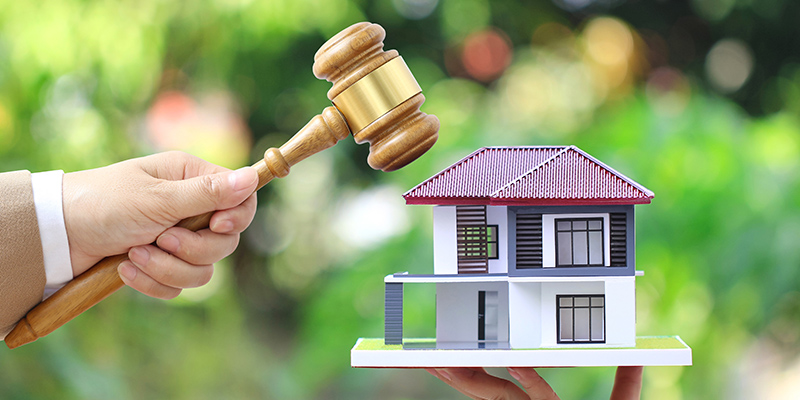HOA Lien: What Is It And What To Do If Your Home Has It

An HOA lien can put a strain on a homeowner's finances and even jeopardize ownership. Homeowners associations use it as a tool to collect unpaid dues, but there are limitations as well. Homeowners living in HOA communities should understand how liens work and what they can do to remedy or avoid it altogether.
Browse By Category
Sign up for Our Newsletter
An HOA lien can put a strain on a homeowner’s finances and even jeopardize ownership. Homeowners associations use it as a tool to collect unpaid dues, but there are limitations as well. Homeowners living in HOA communities should understand how liens work and what they can do to remedy or avoid it altogether.
Understanding HOAs and HOA Fees
Before you can understand the HOA lien meaning, it is first important to familiarize yourself with homeowners associations. An HOA is a planned development governed by a set of covenants, bylaws, and rules. These communities usually have common areas and amenities that residents can enjoy. Maintaining these areas, though, takes funds — and this is where HOA fees come in.
Homeowners have an obligation to pay regular fees or dues to the association. The HOA then uses these fees to pay for various expenses related to maintenance and upkeep. On occasion, an HOA may also levy special assessments.
When a homeowner fails to pay their dues and assessments, an HOA can take several actions. Depending on state laws and the HOA’s governing documents, these actions typically include charging late fees and interest, suspending a member’s privileges, filing a lawsuit, and placing a lien on the home.
What Is an HOA Lien?
Simply put, an HOA lien is a legal right that automatically attaches to an owner’s property once they become delinquent on their dues and assessments. More often than not, the lien an HOA has on a home attaches on the due date of the assessment or once the association files a notice of lien in the land records.
In addition to the lien itself, a homeowner may also find themselves liable for other charges. Depending on the CC&Rs, these charges can include unpaid dues, late charges, collection costs (such as attorneys’ fees), fines, and interest.
Can an HOA Put a Lien on My House?
In a word, yes. An HOA typically does have the authority to place a lien on a homeowner’s property. However, this authority ultimately depends on state laws and the HOA’s governing documents.
In some states, the law requires associations to record the lien with the county land records. Other states don’t have such a requirement. There are also cases wherein an HOA can put a lien on a home for unpaid fines as a result of violations. However, this can vary depending on the state and the governing documents of the community.
What Happens If You Don’t Pay the Lien?
 The primary concern most homeowners have when faced with a lien is the possibility of foreclosure. In most cases, an HOA can subsequently initiate foreclosure proceedings after attaching a lien. This means owners can lose their homes over unpaid dues to the association. An HOA typically uses this as a last resort to satisfy delinquent debts.
The primary concern most homeowners have when faced with a lien is the possibility of foreclosure. In most cases, an HOA can subsequently initiate foreclosure proceedings after attaching a lien. This means owners can lose their homes over unpaid dues to the association. An HOA typically uses this as a last resort to satisfy delinquent debts.
Apart from foreclosure, though, there are other difficulties related to an HOA lien. A lien adds stress to your life and can put a strain on your friendship with your neighbors. It can also impact your credit score. With a lien, you will also find it harder to sell or refinance your home. In the end, your home’s property value will plummet.
The Negative Impact of Liens on an HOA
An HOA lien poses negative implications not only for the homeowner but also for the HOA. Filing liens will cost the association money in legal fees. Additionally, if an HOA decides to pursue foreclosure, the proceedings will also require the help of an attorney. Ultimately, the HOA may end up spending more money than it earns from back dues.
To avoid this scenario, an HOA board should take proactive steps in collecting outstanding fees from homeowners. It is wise to have a clear and strict policy when it comes to dues collection. While board members can sympathize with owners who have financial problems, making exceptions all the time will only backfire in due time. An HOA can offer payment plans, though it isn’t a good idea to allow owners to frequently take advantage of such plans.
How Homeowners Can Avoid an HOA Lien
The surest way to avoid having a lien placed on your home is to stay up-to-date on your HOA fees. Missing payments, intentionally or otherwise, will force an HOA to take collection actions. This includes attaching a lien to your property, which could trigger foreclosure proceedings.
If you have violation fines, it’s also best to settle them on time and in full. Not all HOAs can place a lien and foreclose on a home based on fines alone. However, there are some that can, making it easier to lose your home.
Of course, every now and then, you may struggle with financial issues, compromising your ability to pay your fees regularly. If this happens to you, it is important to communicate with your HOA board. It may feel uncomfortable to share your financial problems with people who are essentially your neighbors, but it will help ease some of the burden on you.
Your HOA board may offer you an interest-free payment plan. This will allow you to settle your outstanding debts without worrying about potentially losing your home. Make sure to document your agreement with your HOA and keep records of all invoices, receipts, and important documents. These will help protect your interests in the event of legal action.
It is worth noting, though, that payment plans aren’t offered on a regular basis. Most HOAs have rules that limit payment plans to once per homeowner. Some associations don’t offer them at all. However, some states have laws that require HOAs to offer payment plans. An example of this is Colorado, where HOAs must offer a 6-month payment plan (Section 38-33.3-316.3).
What Happens in an HOA Lien Foreclosure?
After a lien attaches to a homeowner’s property, an HOA’s next step is to foreclose on it. A homeowners association lien foreclosure can typically happen even if there is an existing mortgage on the property.
There are two ways an HOA can foreclose on a home: judicially and nonjudicially. The manner in which a particular HOA can foreclose on a home depends on state laws and the association’s governing documents.
- Judicial Foreclosures. With judicial foreclosures, an HOA must file a lawsuit and seek a judgment from the court. This judgment will allow the HOA to sell the home to satisfy the lien and settle the owner’s debt.
- Nonjudicial Foreclosures. With nonjudicial foreclosures, an HOA need not go through the court to foreclose on a home. To foreclose on a home nonjudicially, an HOA must follow specific procedures according to state laws and the governing documents.
It is important to know that state laws may impose certain requirements when it comes to HOA foreclosures. A good example is California. According to Civil Code Section 1367.4, an HOA can only foreclose on a home if the owner’s delinquent fees equal or exceed $1,800 or if the owner has remained delinquent for at least 12 months.
Effect of an HOA Lien on a Mortgage
Typically, state laws or an HOA’s governing documents will contain a provision that details the priority of an HOA lien over all other liens recorded after recording the CC&Rs. Normally, the only exception to this is the deed of trust or first mortgage that was recorded prior to the date of delinquency. In this case, the first mortgage stays intact even after an HOA foreclosure. Of course, this does not apply to an HOA super lien, discussed further below.
After foreclosure, the borrower or homeowner retains responsibility over the mortgage. This is because they are the party who entered the agreement with the lender. The HOA has no obligation to pay the first mortgage holder even if it assumes ownership of the property after foreclosure.
Borrowers often stop making payments to the first mortgage holder after an HOA foreclosure. When this happens, an HOA has a few options. It can pay the first mortgage holder to stop them from foreclosing on the property. This isn’t the route that most HOAs take. After all, an HOA isn’t responsible for the mortgage payment.
The other option is to allow the first mortgage holder to foreclose. Allowing the first mortgage holder to foreclose will turn over the ownership to someone new who will then be responsible for HOA fees.
What Happens to the Second Mortgage Lien?
The second mortgage lien usually sits lower on the priority list, behind HOA liens. As such, after an HOA forecloses on a home, all other junior liens, such as the second mortgage, become void. These liens will then detach from the property title.
Still, the borrower retains their obligation to pay the mortgage holder. This is because the borrower entered an agreement with the lender and signed a promissory note. At this point, the second mortgage holder has the option to file a lawsuit against the borrower to satisfy the debt if they stop making payments.
What Is an HOA Super Lien?
Most of the time, an HOA’s lien holds priority over all other liens and encumbrances, except for a first mortgage, in the event of an HOA foreclosure. However, in some states, an HOA can have as super lien, giving it priority even over a first mortgage. There are still some limitations to this, though, depending on the state.
If an HOA has super lien status, foreclosure sale proceeds will first go towards satisfying the delinquent dues. This is usually capped to a certain amount or number of months’ worth of unpaid HOA fees. After that, the first mortgage holder will be paid using the proceeds from the foreclosure sale. If there are any proceeds left, they will go to junior lienholders according to priority.
How an HOA Files a Lien
State laws and an HOA’s governing documents will dictate how an HOA must file a lien. More often than not, though, the process follows the steps below.
- Notice. The HOA must give the homeowner notice of their unpaid dues and a chance to remedy the situation. Normally, the HOA will send multiple notices using mail and/or email. The HOA will also attempt to reach out to the homeowner via phone to collect the unpaid dues.
- Demand Letter. If the first step doesn’t yield any results, the HOA may send a demand letter to the homeowner. This letter outlines the amounts the owner owes to the HOA as well as a warning of the HOA’s plan to file a lien if the owner fails to satisfy their debt within a given timeframe.
- Filing the Lien. If the homeowner remains in debt to the HOA and doesn’t attempt to correct the issue, the HOA will then file the lien. This usually involves filing the lien with the county recorder’s office.
- Foreclosure. Homeowners usually make an effort to settle their unpaid dues after discovering the lien filing. However, some owners remain unfazed. An HOA’s last step is to initiate foreclosure proceedings in an attempt to satisfy the owner’s debts to the associaton.
Do HOA Liens Expire?
Believe it or not, there is an HOA lien statute of limitations. An HOA lien can expire, depending on state laws and the governing documents. Typically, an HOA must take action to enforce the lien within a specified timeframe, such as foreclosing on the lien. Otherwise, the lien will become void and unenforceable.
How to Redeem Your Home After an HOA Foreclosure
 There are states that provide a right of redemption following a foreclosure sale. This means you can repurchase the property after the HOA forecloses on your home.
There are states that provide a right of redemption following a foreclosure sale. This means you can repurchase the property after the HOA forecloses on your home.
California law gives you 90 days in a nonjudicial foreclosure. During this redemption period, you can regain ownership of your property if you pay the lien amount, plus any fees, costs, and permitted charges. If repairs were made to the property, you must also reimburse the buyer.
Texas law offers a 180-day redemption period from the date the HOA mails the written notice of sale to you. The right of redemption period can vary greatly from one state to another. Other states don’t offer them at all.
Does an HOA Lien and Foreclosure Affect Your Credit Score?
In theory, an HOA lien and foreclosure can negatively affect your credit score. Most HOAs don’t report the delinquent dues to credit reporting bureaus. Even if the situation doesn’t reach foreclosure, though, your credit score can still drop if your HOA refers your account to a collection agency. This is because collection agencies might report the missed payments to credit reporting bureaus.
However, if you lose ownership of your home through an HOA foreclosure, your credit score is likely to take a hit. An HOA might not report the foreclosure, but it will likely appear in your credit history. This is because judicial foreclosures involve court filings, which are records accessible to the public.
Nonjudicial foreclosures, on the other hand, don’t go through the courts. However, they still involve recording a notice in the land records. These records are also accessible to the public. Sooner or later, credit bureaus will find out.
It is unclear, though, how much of a hit your credit score might take. According to general estimates, your FICO score might drop by at least 100 points, but it can still vary from one person to another. Typically, the higher your credit score prior to the foreclosure, the bigger the impact afterward.
A low credit score will make it harder for you to apply for a new loan or secure credit. This will make it more difficult to buy a new home, as lenders check credit scores as part of their due process. You might get turned down for a loan or only be eligible for a loan with a high interest rate.
The Best Solution
An HOA lien can be a headache to deal with, both for the homeowner and the HOA. As such, it is best to avoid liens at all costs. Homeowners can do this by paying their dues on time and in full. Meanwhile, HOAs can do this by enacting a strict collection policy and exhausting all collection efforts, only using liens and foreclosures as a last resort.
An HOA management company can help your HOA board navigate the ins and outs of liens. Look for the best one in your area using our online directory!
RELATED ARTICLES:
- Everything You Should Know About HOA Fines
- HOA Payment Plans: Should These Be Offered To Late Payers?
- Are Your HOA Fees Too High? Here’s How To Lower HOA Fees
Trending Now
Related Article
Sign up for Our Monthly Newsletter
Sign up below for monthly updates on all HOA Resource
















